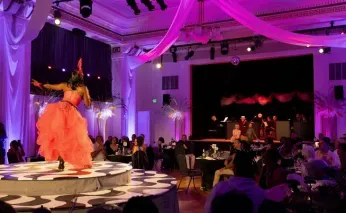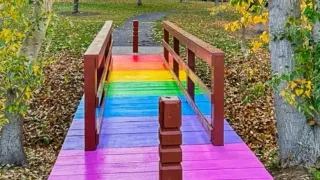
Jun 15
‘The Copacabana Supper Club’ – a sensory journey through Brazilian romance
Stephen LeBlanc READ TIME: 1 MIN.
Bay Area cultural sophistication meets authentic Brazilian traditions in “The Copacabana Supper Club,” a fabulous and uniquely immersive Bossa Nova entertainment experience gracing the newly renovated Henry J. Kaiser Center for the Arts in Oakland. Running Thursdays through Sundays until June 29, this intimate supper club production offers audiences a complete sensory journey that transports guests into the heart of Brazilian romance and rhythm.
Co-curators Kristopher McDowell and Glauco Araujo (creative and married partners) have assembled a sophisticated mélange that weaves together authentic Brazilian cuisine, sultry Brazilian song and dance, and cleverly integrated pop Americana elements. The result is an evening that delights not just the senses, but the sensibilities of those seeking a unique artistic experience.
The evening’s narrative structure revolves around a mini-play that connects the musical numbers through compelling character development. Female lead Phoenyx Rose embodies Morena, the enigmatic club owner harboring secret motivations, while male lead Araujo portrays Carioca, a newly arrived Brazilian dancer navigating American culture without English language skills or clear direction. Their performances are both strong and dynamically engaging; creating genuine chemistry that drives the story forward.
Echoing aspects of Glauco’s own journey from classically trained Rio de Janeiro dancer to internationally recognized performer, Carioca’s transformation from uncertain newcomer to the epitome of the suave, sexy, mysterious South American man provides the evening’s emotional arc. Morena’s role as catalyst in this transformation adds layers of complexity that elevate the production. The show plays with American romantic stereotypes while simultaneously illustrating authentic struggles that such characters encounter in contemporary America.

Flavors and fun
The diverse ensemble and solo song and dance numbers feature a carefully curated cast of accomplished local performers alongside guest artist Araujo, ensuring each musical moment feels authentic. Complementing the performances, the culinary offerings showcase small plates, entrées, and desserts that burst with intense, authentic Brazilian flavors, expertly prepared by Oakland’s renowned Chef Nelson of Sobre Mesa. The evening provides to a top-rate selection of cocktails and wines that perfectly complement the evening’s atmosphere.
The jazz/samba musical arrangements come alive through an ensemble of celebrated professional Bay Area musicians who bring decades of experience to every note. Musical director Larry Dunlap anchors the sound on piano, while Tim Devine’s saxophone work adds sultry depth.
Konstantins Jemeljanovas delivers brilliant trumpet flourishes, Christian Pepin provides rhythmic percussion foundation, and Sascha Jacobsen's bass lines create the perfect foundation. Eric Swinderman’s guitar work weaves through the arrangements with finesse, while Jeff Hanson and Sylvia Cuenca share drumming duties that keep the energy flowing throughout the evening.
The musical program strikes an inspired balance between beloved Brazilian classics and unexpected American popular songs. Traditional Bossa Nova standards like “The Girl from Ipanema” receive fresh interpretations, while American favorites such as “Life Is Just a Bowl of Cherries” and Barry Manilow's “Copacabana” are reimagined through Brazilian sensibilities.

Savory storytellling
The evening’s highlights include the live performance of “Waters of March” (“Águas de Março”), the Bossa Nova/Jazz anthem composed by Antônio Carlos Jobim in 1973, and Araujo’s mesmerizing solo dance numbers that showcase his classical training and natural charisma.
Bay Area native Kristopher McDowell explained the production’s philosophy.
“Glauco and I conceived of a Brazilian-inspired evening that included storytelling, food, and music, and that also provided space for local performing artists to thrive,” he said. This commitment to supporting regional talent while maintaining artistic sophistication permeates every aspect of the production.
The show represents one of the very first events at the newly renovated Henry J. Kaiser Center for the Arts. The building’s meticulous restoration shines brilliantly in the beautiful ballroom that hosts the performance. The space itself becomes part of the experience, with elegant architectural details that complement the evening’s sophisticated atmosphere.
Currently, the Henry J. Kaiser Center for the Arts awaits its grand opening in October, and as a result, the entire block-long building remains surrounded by chain-link fencing. Guests should note that entry requires walking or driving to the parking lot, where ample free parking is available.
The Center has enthusiastically backed and is presenting this fantastical experience to introduce the wider Bay Area arts and performance community to the exciting possibilities that will emerge from the several performance and event spaces that will soon be available in the Kaiser Center for the Arts building.
In summary, the venue is beautiful, the musicians are first-rate, and the song and dance program delivers both fun and originality in equal measure. This production succeeds because it respects both its Brazilian roots and its American setting, creating an evening that feels both authentic and accessible.
For anyone seeking an evening that combines culinary excellence, musical sophistication, and theatrical charm, “The Copacabana Supper Club” offers an experience that lingers long after the final note fades.
‘The Copacabana Supper Club,’ $57-$77, Thu-Sun through June 29, Henry J. Kaiser Center for the Arts, 10 10th Street, Oakland (two blocks from the Lake Merritt BART station).
http://www.hjkarts.com






